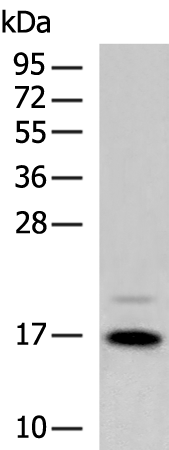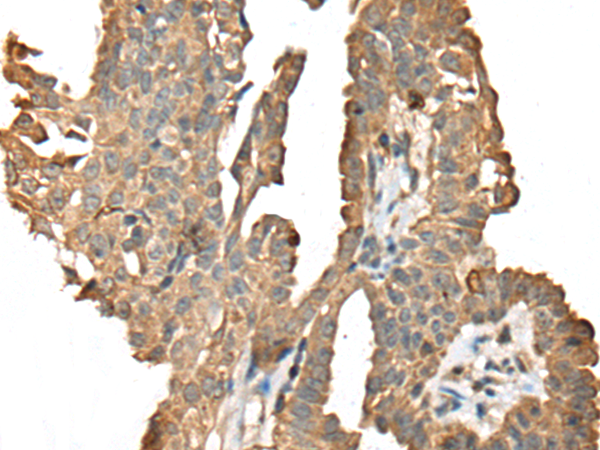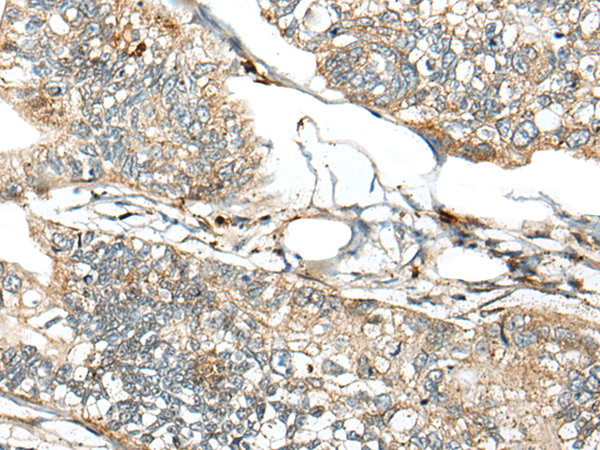


| WB | 咨询技术 | Human,Mouse,Rat |
| IF | 咨询技术 | Human,Mouse,Rat |
| IHC | 1/25-1/100 | Human,Mouse,Rat |
| ICC | 技术咨询 | Human,Mouse,Rat |
| FCM | 咨询技术 | Human,Mouse,Rat |
| Elisa | 1/5000-1/10000 | Human,Mouse,Rat |
| Aliases | T3Z; CD3H; CD3Q; CD3Z; TCRZ; IMD25; CD3-ZETA |
| WB Predicted band size | 19 kDa |
| Host/Isotype | Rabbit IgG |
| Antibody Type | Primary antibody |
| Storage | Store at 4°C short term. Aliquot and store at -20°C long term. Avoid freeze/thaw cycles. |
| Species Reactivity | Human, Mouse |
| Immunogen | Fusion protein of human CD247 |
| Formulation | Purified antibody in PBS with 0.05% sodium azide and 50% glycerol. |
+ +
以下是3篇与CD247(CD3ζ)抗体相关的文献及其摘要概述:
1. **文献名称**: *"Structural basis for assembly of the T cell receptor–CD3 complex"*
**作者**: Dong et al.
**摘要**: 该研究通过冷冻电镜解析了T细胞受体(TCR)-CD3复合物的结构,揭示了CD3ζ亚基(CD247)在稳定TCR-CD3复合物中的关键作用,并阐明了其胞内段ITAM结构域的信号传递机制。
2. **文献名称**: *"CD3ζ defects in systemic lupus erythematosus patients cause compromised T cell function"*
**作者**: Nambiar et al.
**摘要**: 研究发现系统性红斑狼疮(SLE)患者T细胞中CD3ζ(CD247)表达降低,通过抗体检测和功能实验证实CD3ζ缺失导致T细胞信号异常,与自身免疫疾病进展相关。
3. **文献名称**: *"Targeting CD3ζ for cancer immunotherapy: CAR-T cells and beyond"*
**作者**: Guedan et al.
**摘要**: 综述了基于CD3ζ信号域的嵌合抗原受体(CAR)在T细胞疗法中的应用,强调针对CD247设计的抗体或CAR结构可增强抗肿瘤活性,并讨论其临床转化潜力。
以上文献均涉及CD247抗体的实验应用(如检测、信号机制研究)或作为治疗靶点的开发。如需具体文章链接或发表年份,可进一步补充信息。
CD247. also known as CD3ζ (zeta chain), is a critical component of the T-cell receptor (TCR) complex, which plays a central role in adaptive immunity. It is encoded by the *CD247* gene and forms homodimers that associate with CD3γ, CD3δ, and CD3ε subunits to constitute the TCR-CD3 complex on T cells. This transmembrane protein contains immunoreceptor tyrosine-based activation motifs (ITAMs) in its cytoplasmic domain, enabling signal transduction upon antigen recognition. Upon TCR engagement, CD3ζ undergoes phosphorylation, initiating downstream signaling cascades essential for T-cell activation, proliferation, and cytokine production.
Antibodies targeting CD247 are widely used in research and clinical applications. In diagnostics, anti-CD247 antibodies help identify T cells via flow cytometry or immunohistochemistry. Therapeutically, CD3ζ-directed antibodies have been explored in immunomodulation, particularly in bispecific T-cell engagers (BiTEs) or chimeric antigen receptor (CAR) T-cell therapies, where they enhance cytotoxic T-cell responses against tumors. Additionally, monoclonal antibodies like teplizumab (anti-CD3) have shown promise in autoimmune diseases (e.g., type 1 diabetes) by modulating T-cell activity.
CD247 antibodies also aid in studying T-cell signaling defects, immunodeficiency disorders, and TCR-mediated pathologies. Their specificity makes them valuable tools for dissecting mechanisms of immune activation, tolerance, and therapeutic resistance. However, challenges remain in minimizing off-target effects and cytokine release syndromes in clinical applications. Ongoing research focuses on optimizing antibody design to improve efficacy and safety in cancer immunotherapy and autoimmune treatments.
×